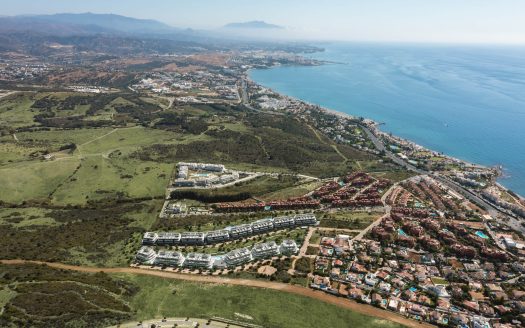Investing in real estate abroad: strategies for maximum ROI in Spain
The world of real estate offers a range of opportunities for investors seeking diversification and potentially high returns (ROI). Investing in real estate abroad can be an attractive option for those looking to take advantage of favorable market conditions, stable economies and growing demand for properties in emerging destinations.
Investing abroad provides access to new markets with unique opportunities. By spreading your investment portfolio across different countries, you can reduce your risks and take advantage of various economic cycles and growth scenarios. Moreover, real estate investments abroad can lead to attractive returns, depending on location, property type and supply-demand ratios.
Before taking the step to invest abroad, it is crucial to carefully weigh the benefits and challenges. Thorough research and a solid investment strategy are essential for success in the international real estate market.

Advantages of investing in real estate abroad
Investing in real estate abroad can offer numerous advantages for forward-thinking investors. Here are some of the key reasons why it may be worthwhile to set your sights beyond borders to optimize ROI:
- Diversification: By diversifying your investment portfolio across different countries (or regions within a country) and markets, you can reduce your risks and take advantage of various economic cycles and growth scenarios.
- Potentially higher returns: Some foreign markets may offer more attractive returns than your home market, depending on supply-demand relationships, economic growth or even local tax laws.
- Access to growth markets: Emerging economies can provide opportunities for early investors, with the ability to benefit from rising housing prices and increasing demand.
- Tax advantages: Some countries offer favorable tax regimes for foreign investors, allowing you to keep more of your returns.
- Lifestyle benefits: Investing in real estate abroad can also provide the opportunity to enjoy a different lifestyle or culture, such as by buying a vacation home.
While the benefits may be attractive, it is important to carefully evaluate the risks and challenges of investing abroad before making a decision. That way, you maximize ROI and minimize risk.
Important factors in choosing an investment location
When evaluating potential investment locations for real estate abroad, there are several crucial factors to consider. These factors can greatly affect the success of your investment (and consequently ROI) and must be carefully considered.
- Economic stability and growth: Examine the country’s economic performance and outlook, including GDP growth rate, employment rates and inflation rate. A stable and growing economy can lead to increasing demand for real estate and rising home prices.
- Political and legal environment: Evaluate the political stability and quality of the rule of law in the target country. A solid legal system and clear property laws are essential for protecting your investment. Rental laws are also important if you plan to rent out your investment property.
- Demographic trends: Analyze population growth, age structure and migration movements in the region where you want to invest. These factors can affect demand for residential and commercial properties.
- Infrastructure and facilities: Assess the quality of infrastructure, such as roads, public transportation, utilities and telecommunications. These factors can affect the attractiveness of a location to residents and businesses.
- Supply and demand in the real estate market: Study the current supply-demand relationships in the local real estate market, as well as the prospects for future growth. A balanced market with healthy demand can lead to stable housing prices and rental income.
- Taxes and regulations: Research the tax laws and regulations applicable to foreign real estate investments in the target country. Favorable tax regimes can increase the attractiveness of a location.
- Accessibility and connectivity: Evaluate site accessibility, including proximity to airports, tourist destinations and major cities. Good connectivity can increase a property’s attractiveness to potential tenants or buyers. Tourist locations close to an airport are ideal for rental properties as an investment.
By carefully considering these factors, you can make an informed decision on the most suitable location for a high ROI from your real estate investment abroad.
Strategies for maximum ROI in Spain
Spain is a popular destination for foreign real estate investment, with its favorable climate, rich culture and growing economy. Here are some strategies to achieve maximum return (ROI) when investing in real estate in Spain:
- Choose the right location: Concentrate your search on popular tourist destinations such as the Costa del Sol, the Balearic Islands and the Canary Islands. These areas offer constant demand for vacation rentals and often have attractive rental potential.
- Invest in renovation projects: Consider buying properties in need of renovation and add value by refurbishing them. This strategy can lead to significant appreciation in value and higher returns on sale, especially in urban, heavily built-up environments this is ideal.
- Rentals to tourists: By offering your property as a vacation rental, you can take advantage of the lucrative tourist market in Spain. Make sure you are familiar with local rental laws and consider using a reliable management agency.
- Diversify your portfolio: Spread your investments across different property types, such as apartments, villas and commercial properties. This helps limit your risks and offers different sources of income. You can also choose to spread your real estate across different regions in Spain.
- Consider new construction projects: New construction projects in emerging areas can be an attractive investment, with the opportunity to capitalize on growing demand and potentially higher value growth.
- Stay abreast of local trends: Monitor the local real estate market and economic trends closely so you can respond to changes and identify new opportunities in a timely manner.
- Seek expert advice: Work with local real estate agents and advisors who are familiar with the Spanish market (and preferably have expertise in one specific region within Spain). Their expertise can be crucial in navigating the complexities of investing abroad.
By applying these strategies and conducting thorough research, you can significantly increase your chances of a successful Return On Investment when investing in real estate in Spain and take advantage of the potential returns this popular destination has to offer.
How much return can you expect on real estate investments?
The expected return on investing real estate abroad can vary greatly depending on several factors such as location, property type, market conditions and your investment strategy. Here are some general guidelines for the returns you can expect on real estate investments:
- Rental yield: The rental yield, also called the gross initial yield, indicates the annual rental amount as a percentage of the purchase price. For properties in popular cities, rental yields can range from 3% to 6%, depending on location and supply-demand ratios.
- Value Growth: Value growth, also known as capital growth, represents the increase in the value of your real estate holdings over time. In stable markets, value growth can be between 3% and 6% per year, but in emerging markets or popular areas, this rate can be significantly higher.
- Total return: Total return is the combination of rental yield and value growth. A realistic total return for real estate investments can range from 6% to 12% per year, depending on location, property type and market conditions.
It is important to note that these returns are only general guidelines and individual investments can vary significantly. Factors such as the quality of the property, rents in the area, supply-demand ratios and your investment strategy can greatly affect the final return/ROI.
Investing real estate abroad vs investing in the stock market
Both real estate investments and stock market investments offer opportunities for capital appreciation, but there are some key differences that investors should consider:
| Real estate investments | Investing in the stock market | |
| Liquidity | Real estate is generally less liquid, which means it can be more difficult to buy or sell at very short notice. | Stocks and other securities are generally more liquid and can be traded more quickly. |
| Leverage | Real estate investments often offer the option of borrowing, which can lead to higher returns but also more risk. It also does ensure that you can use your own capital for other investments while using the borrowed money to pay off the property. | Investing in the stock market usually requires less leverage, but can still be risky. |
| Diversification | Real estate investments offer diversification within the real estate market, but limited diversification across asset classes. | Investing in the stock market offers the opportunity to diversify across different sectors, companies and asset classes. |
| Check | With real estate investments, you have more control over your property and can make decisions about management and improvements. | When investing in the stock market, you have limited control over the performance of individual companies. |
| Passive income | Real estate investments can generate passive income through rental income. | Investing in the stock market generally generates passive income, especially when you receive dividends. |
| Tax benefits | Real estate investments may in some cases offer tax advantages, such as deductible expenses and depreciation. | Tax benefits for investing in the stock market can vary depending on legislation. |
Ultimately, the choice between real estate investing and stock market investing depends on your personal goals, risk tolerance and investment horizon. A diversified portfolio that includes both real estate and securities can provide a balanced approach to capital appreciation and risk diversification with maximum ROI. If you borrow to pay off your new construction home, during the construction period that averages 1.5-2.5 years, you can use your equity to invest in stocks. With the proceeds, you can then pay the interest on your loan, and if you have done good business, you will keep a nice perk.
Popular destinations for real estate investment in Spain with maximum ROI
Spain is a popular destination for investing real estate abroad, thanks to its favorable climate, rich culture and growing economy. Here are some of the most attractive locations for real estate investment in Spain, maximizing your ROI:
- Costa del Sol: This coastal region in southern Spain, with cities such as Marbella, Málaga and Estepona, is a popular destination for tourists and real estate investment. The region offers excellent infrastructure, numerous golf courses and a vibrant real estate market.
- Barcelona: The cosmopolitan city of Barcelona is a popular choice for investors looking for both residential and commercial real estate. The city offers a vibrant culture, excellent amenities and a strong economy.
- Madrid: The capital Madrid is an economic and financial center, making it an attractive location for investment in office space and apartments. The city has a growing population and strong demand for housing.
- Balearic Islands: The Balearic Islands, with Mallorca and Ibiza as the most popular destinations, are a popular choice for vacation homes and luxury real estate investments. The islands offer beautiful nature, a vibrant tourism industry and a stable real estate market.
- Canary Islands: This Spanish archipelago in the Atlantic Ocean, with Tenerife and Gran Canaria as main destinations, is popular with both tourists and real estate investment. The islands offer a pleasant climate, beautiful beaches and a growing demand for vacation homes.
- Valencia: Located on the Mediterranean coast, the city of Valencia is an emerging destination for real estate investment. The city offers excellent infrastructure, cultural attractions and a vibrant economy, making it an attractive choice for both residential and commercial real estate.
When evaluating potential investment locations in Spain, it is crucial to carefully examine factors such as local supply-demand ratios, infrastructure, economic growth and tourist appeal. A thorough analysis of these factors can help you make the right choice for your specific investment objectives.
Tips for investing in real estate abroad
Investing in real estate abroad can be a rewarding venture, but it also comes with unique challenges. Here are some valuable tips to increase your chances of success:
- Do extensive research: Thoroughly study local market conditions, laws, tax regulations and cultural norms before investing. A thorough knowledge of the local environment is essential.
- Work with local experts: Enlist the help of trusted real estate agents, lawyers and accountants who know the local market well. Their expertise and insights can be invaluable.
- Consider a management agency: If you do not live locally, using a professional management agency can be helpful in managing your property and maintaining relationships with tenants. Especially if you are making property investments in different locations that are geographically far apart.
- Be prepared for cultural differences: Respect the local culture and customs and be prepared to adapt. What is considered normal in your home country may be interpreted differently in another culture.
- Master the language: Learning basic skills in the local language can help build better relationships and navigate the local bureaucracy. In tourist regions, you can often get by in English.
- Prepare for additional costs: In addition to the purchase price of the property, you need to consider additional costs such as notary fees, transfer taxes and furnishing or renovation costs.
- Diversify your portfolio: Spread your risks by investing in different types of properties, locations and countries to reduce the impact of local market fluctuations.
- Stay up-to-date: Stay abreast of changes in local laws, tax regulations and market trends that may affect your investment.
By heeding these tips and following a sound investment strategy, you can be better prepared for the challenges of investing in real estate abroad and increase your chances of successful returns.
Real estate investment guidance and advice
Investing in real estate, especially overseas, can be a complex and challenging endeavor. Professional guidance and advice can be critical to achieving your investment goals, maximizing ROI and avoiding potential pitfalls.
There are different types of experts who can assist you with your real estate investments:
- Real estate agents: Local real estate agents with a thorough knowledge of the market can help you find suitable properties and advise you on prices, locations and trends.
- Lawyers: Lawyers specializing in real estate law can guide you through the legal aspects of the purchase, such as contracts, title transfer and compliance with local laws.
- Tax consultants: Tax consultants can advise you on the tax implications of your real estate investment and identify potential tax benefits. An attorney specializing in real estate usually has tax advisors in
- Financial planners: Financial planners can help you integrate your real estate investment into your broader financial planning and manage your asset portfolio.
- Property managers: If you do not live locally, professional property managers can take on the day-to-day tasks of managing your property, such as finding tenants, collecting rent and maintenance.
Engaging expert guidance can increase the cost of investing real estate abroad, but can also lead to better decisions, risk reduction and ultimately higher returns. It is important to carefully select and work with reliable professionals who have your best interests at heart.
Conclusion: maximizing ROI when investing abroad
Investing in real estate abroad offers a world of opportunities for forward-thinking investors. By taking advantage of favorable market conditions, stable economies and growing demand for properties in emerging destinations, foreign real estate investments can lead to attractive returns and diversify your portfolio with maximum Return On Investment.
When evaluating potential investment locations, it is crucial to carefully consider factors such as economic stability, demographic trends, infrastructure and supply-demand ratios. Spain remains a popular destination, with its favorable climate, rich culture and growing economy. Cities such as Barcelona, Madrid and coastal areas such as the Costa del Sol, the Balearics and the Canary Islands offer excellent opportunities for both residential and commercial real estate.
While the potential returns can be attractive, investing in real estate abroad also presents unique challenges. It is essential to do extensive research, work with local experts and develop a solid investment strategy that matches your goals and risk tolerance.
By following these steps and taking advantage of professional guidance and advice, you can significantly increase your chances of success when investing real estate abroad and take advantage of the potential returns and diversification benefits this exciting market has to offer.
Interested in investing in Spanish real estate?












